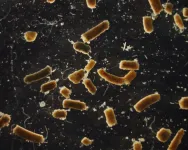INFORMATION:
The study - Personality Pathways to Mortality: Interleukin-6 Links Conscientiousness to Mortality Risk by Páraic S O'Súilleabháin, Nicholas A Turiano, Martina Luchetti, Denis Gerstorf, Stephen Gallagher, Amanda Sesker, Antonio Terracciano, Angleina R Sutin - has been published in the journal Brain, Behavior, and Immunity.
For more see here: https://www.sciencedirect.com/science/article/pii/S0889159121000362.
For further information, please contact:
Alan Owens
Communications Officer
University of Limerick
+353 87 908 6633
+353 61 213000
alan.owens@ul.ie
About University of Limerick:
The University of Limerick is an independent, internationally focused university with 16,500 students and 1,700 staff. It is a young, energetic and enterprising university with a proud record of innovation in education and excellence in research and scholarship.
More information is available at http://www.ul.ie.
Tweet @UL
Facebook.com/universityoflimerick
LinkedIn University of Limerick
Snapchat U of Limerick
University of Limerick research finds new link between personality and risk of death
Ground-breaking research led by University of Limerick, Ireland has revealed for the first time that the immune system directly links personality to long-term risk of death
2021-02-17
(Press-News.org) Ground-breaking research led by University of Limerick has revealed for the first time that the immune system directly links personality to long-term risk of death.
The study sheds new light on why people who are more conscientious tend to live longer.
Results from the new international study published in the journal Brain, Behavior, and Immunity have found that the immune system plays a previously unknown role in the link between personality traits and long-term risk of death.
"Personality is known to be associated with long-term risk of death, it is a well replicated finding observed across numerous research studies internationally," explained Principal Investigator on the study Dr Páraic Ó Súilleabháin, from the Department of Psychology and Health Research Institute at University of Limerick, Ireland.
"The critical question is 'how'. We wanted to find out if a biological pathway such as our immune system may explain why this happens.
"Our personality is critically important throughout our lives, from early stages in our development, to the accumulation of the impact of how we think, feel, and behave across our lives, and in the years preceding our death. It is also becoming increasingly apparent how important personality actually is for our long-term health and resulting longevity. For instance, it has been shown that people scoring lower on the personality trait of conscientiousness (a tendency to be responsible, organized, and capable of self-control) can be at a 40% increased risk of future death compared to their higher scoring counterparts. What is not clear is how this could happen, and importantly, what biological pathway might be responsible for this link," added Dr Ó Súilleabháin.
Led by Dr Ó Súilleabháin, this study was conducted with a team of collaborators from the Department of Psychology at UL, the Department of Psychology at West Virginia University, the Department of Psychology at Humboldt University Berlin, and the College of Medicine at Florida State University.
The researchers wanted to investigate if two biological markers which are central to the immune system may explain why personality traits are associated with long-term mortality risk. Specifically, they wanted to test if interleukin-6 and c-reactive protein which are known to play an important role in age-related morbidity may explain how our personality traits are related to how long we live. The study was drawing on data from the Midlife in the United States Longitudinal Study carried out on 957 adults who were examined over a 14-year period.
Dr Ó Súilleabháin explained: "We found that part of the reason why people who score higher on the personality trait of conscientiousness live longer is as a result of their immune system, specifically due to lower levels of a biological marker called interleukin-6. There are likely further biological mechanisms that are yet to be discovered which will give a clearer picture of all the different ways that our personalities are so critical to our long-term health.
"These findings are very important and identify for the first time that an underlying biological marker directly links personality to long-term mortality risk. With replication, these findings provide an opportunity for future interventions to increase our longevity and health across the lifespan," Dr Ó Súilleabháin added.
ELSE PRESS RELEASES FROM THIS DATE:
The psychological effects of COVID-19 on pregnancy and postpartum
2021-02-17
Women who gave birth during the COVID-19 pandemic report having felt greater stress in the delivery process, and rate lower the quality of care received.
Furthermore, almost 15% more women developed symptoms of postpartum depression after giving birth during the pandemic
A study carried out by researchers from the University of Granada (UGR) indicates that psychological variables have contributed to more severe anxiety and depression among pregnant women since the COVID-19 pandemic began. These psychological variables include the general stress suffered, the concerns that women have about the pregnancy itself, personal resilience, insomnia, fear of catching the virus, or the feeling of loneliness.
This study, published in the journal Medicina Clínica, has revealed that feeling ...
Researchers have proved that that ozone is effective in disinfecting Coronavirus
2021-02-17
Studies have shown that SARS-CoV-2 remains active on aerosols and surfaces for between several hours and several days, depending on the nature of the surface and environmental conditions. Presently, researchers from Tel Aviv University have demonstrated that ozone, which has already long been used as an antibacterial and antiviral agent in water treatment, effectively sanitizes surfaces against Coronavirus after short exposure to low concentrations of ozone. The research team was led by Dr. Ines Zucker from the School of Mechanical Engineering at the Ivy and Eldar Fleischman Faculty of Engineering and the Porter School of the ...
ADHD, DBD and aggressiveness: Risky genetic factors
2021-02-17
People with attention-deficit / hyperactivity disorder (ADHD) combined with disruptive behaviour disorders (DBDs) share about the 80% of genetic variants associated with aggressive and antisocial behaviours.
This is one of the conclusions of a study published in the journal Nature Communications which counts on the participation of professor Bru Cormand, from the Faculty of Biology and the Institute of Biomedicine of the University of Barcelona (IBUB), Sant Joan de Déu Research Institute (IRSJD) and the Rare Diseases Networking Biomedical Research Centre (CIBERER), and researchers Marta Ribasés and Josep Antoni ...
3D-printing perovskites on graphene makes next-gen X-ray detectors
2021-02-17
Since Wilhelm Röntgen discovered them in 1895, X-rays have become a staple of medical imaging. In fact, barely a month after Röntgen's famous paper was published, doctors in Connecticut took the first ever radiograph of a boy's broken wrist.
There has been a lot of progress since. Aside from radiographs, which most people have taken at least once in their lives, today's X-ray medical uses includes fluoroscopy, radiotherapy for cancer, and computer tomography (CT), which takes multiple X-ray scans of the body from different angles and then combines them in a computer to generate ...
How sessile seahorses managed to speciate and disperse across the world's oceans
2021-02-17
The international research collaboration involving the research team led by evolutionary biologist Professor Axel Meyer at the University of Konstanz and researchers from China and Singapore was able to identify factors that led to the success of the seahorse from a developmental biology perspective: its quickness to adapt by, for example, repeatedly evolving spines in the skin and its fast genetic rates of evolution. The results will be published on 17 February 2021 in Nature Communications.
Seahorses of the genus Hippocampus emerged about 25 million years ago in the Indo-Pacific region from pipefish, ...
One in 10 Ohio women thought abortion illegal amid attempts to ban at 6 weeks
2021-02-17
COLUMBUS, Ohio - Though Ohio never formally enacted a so-called "heartbeat bill" banning abortions after six weeks of gestation, legislative and legal actions appear to have fueled beliefs that abortion is illegal in the state, a new study has found.
One in 10 Ohio women surveyed for the study thought abortion was prohibited. The percentage with that belief increased from 5% to 16% during the study period, corresponding to sustained activity to limit abortions from fall of 2018 through summer of 2019. The study appears in the American Journal of Obstetrics and Gynecology.
Maria Gallo, the study's lead author and a professor of epidemiology at The Ohio State University, said repeated legislative attempts at extreme restrictions on abortion, the veto by ...
Hide-and-seek can lead to higher drug prices
2021-02-17
In Switzerland and other European countries, drug prices are regulated to ensure affordable access to drugs. In the last few years, many European countries have introduced rebate schemes for drugs. In most cases, however, the rebates negotiated with the manufacturer are confidential. This means that a country basically has two prices for a drug: an official, higher price and an actual, lower price. Price comparisons of drugs between countries is frequently based on the higher price. Switzerland too has introduced such rebates, which are often confidential, and plans to anchor this practice in the regulation. The Federal Social ...
Fishes contribute roughly 1.65 billion tons of carbon in feces and other matter annually
2021-02-17
Scientists have little understanding of the role fishes play in the global carbon cycle linked to climate change, but a Rutgers-led study found that carbon in feces, respiration and other excretions from fishes - roughly 1.65 billion tons annually - make up about 16 percent of the total carbon that sinks below the ocean's upper layers.
Better data on this key part of the Earth's biological pump will help scientists understand the impact of climate change and seafood harvesting on the role of fishes in carbon flux, according to the study - the first of its kind - in the journal Limnology and Oceanography. Carbon flux means the movement of carbon in the ocean, including from the surface to the deep sea - the focus of this study.
"Our study is the first to review ...
Credit card-sized soft pumps power wearable artificial muscles
2021-02-17
Robotic clothing that is entirely soft and could help people to move more easily is a step closer to reality thanks to the development of a new flexible and lightweight power system for soft robotics.
The discovery by a team at the University of Bristol could pave the way for wearable assist devices for people with disabilities and people suffering from age-related muscle degeneration. The study is published today [17 February] in Science Robotics.
Soft robots are made from compliant materials that can stretch and twist. These materials can be made into artificial muscles that contract when air is pumped into them. The softness of these muscles makes then suited to powering assistive clothing. Until now, however, these ...
Study links prolonged sedentary time to distractibility in adults with obesity, overweight
2021-02-17
CHAMPAIGN, Ill. -- Scientists used accelerometers to track daily activity levels for a week in 89 adults with obesity or overweight and, in a series of tests, measured their ability to multitask and maintain their attention despite distractions. The study revealed that individuals who spent more sedentary time in bouts lasting 20 minutes or more were less able to overcome distractions.
Reported in the International Journal of Obesity, the research adds to the evidence linking sedentary behaviors and cognition, said University of Illinois Urbana-Champaign kinesiology and ...
LAST 30 PRESS RELEASES:
Study: Reported crop yield gains from breeding may be overstated
Stem cells from human baby teeth show promise for treating cerebral palsy
Chimps’ love for crystals could help us understand our own ancestors’ fascination with these stones
Vaginal estrogen therapy not linked to cancer recurrence in survivors of endometrial cancer
How estrogen helps protect women from high blood pressure
Breaking the efficiency barrier: Researchers propose multi-stage solar system to harness the full spectrum
A new name, a new beginning: Building a green energy future together
From algorithms to atoms: How artificial intelligence is accelerating the discovery of next-generation energy materials
Loneliness linked to fear of embarrassment: teen research
New MOH–NUS Fellowship launched to strengthen everyday ethics in Singapore’s healthcare sector
Sungkyunkwan University researchers develop next-generation transparent electrode without rare metal indium
What's going on inside quantum computers?: New method simplifies process tomography
This ancient plant-eater had a twisted jaw and sideways-facing teeth
Jackdaw chicks listen to adults to learn about predators
Toxic algal bloom has taken a heavy toll on mental health
Beyond silicon: SKKU team presents Indium Selenide roadmap for ultra-low-power AI and quantum computing
Sugar comforts newborn babies during painful procedures
Pollen exposure linked to poorer exam results taken at the end of secondary school
7 hours 18 mins may be optimal sleep length for avoiding type 2 diabetes precursor
Around 6 deaths a year linked to clubbing in the UK
Children’s development set back years by Covid lockdowns, study reveals
Four decades of data give unique insight into the Sun’s inner life
Urban trees can absorb more CO₂ than cars emit during summer
Fund for Science and Technology awards $15 million to Scripps Oceanography
New NIH grant advances Lupus protein research
New farm-scale biochar system could cut agricultural emissions by 75 percent while removing carbon from the atmosphere
From herbal waste to high performance clean water material: Turning traditional medicine residues into powerful biochar
New sulfur-iron biochar shows powerful ability to lock up arsenic and cadmium in contaminated soils
AI-driven chart review accurately identifies potential rare disease trial participants in new study
Paleontologist Stephen Chester and colleagues reveal new clues about early primate evolution
[Press-News.org] University of Limerick research finds new link between personality and risk of deathGround-breaking research led by University of Limerick, Ireland has revealed for the first time that the immune system directly links personality to long-term risk of death






